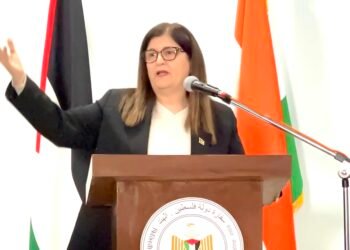NEW YORK: At the United Nations this week, the debate over Palestine shifted from words to warnings. For years, the international community has recycled declarations, resolutions, and summits, but the Israeli-Palestinian conflict remains locked in cycles of war, displacement, and despair. What was different this time was the urgency and the clarity with which Arab, Muslim, and European leaders spoke, underscoring that the global community stands at a dangerous crossroads.
Saudi Arabia’s Foreign Minister, Prince Faisal bin Farhan, was unequivocal in his message: annexation of the West Bank is a red line. Speaking in New York alongside Arab and Muslim leaders, he cautioned that the West Bank, Gaza, and Jerusalem are not bargaining chips but indivisible Palestinian land. The New York Declaration, he noted, affirms these boundaries, yet such declarations “mean little unless they translate into real action that changes the reality of occupation and its aggression.”
The gravity of his words reflected more than diplomatic rhetoric. By labeling Israel’s military actions as “ongoing genocide, famine, and violations” against both Islamic and Christian holy sites, Prince Faisal articulated a collective Arab rejection of not just annexation but of the broader Israeli project of settlement expansion and forced displacement. His call to empower the Palestinian Authority through reforms, funding, and international recognition signaled Saudi Arabia’s intent to back a political alternative to both Hamas and indefinite Israeli control.
More striking was his push for an international accountability mechanism with clear timelines. It was a pointed acknowledgment of the international community’s historic failure: decades of statements without enforcement and resolutions without teeth. By co-chairing the Global Alliance for Implementation of the Two-State Solution with the EU and Norway, Riyadh is attempting to shift the conversation from consensus to consequence.
If Saudi Arabia was the voice of Arab and Muslim unity, Spain offered Europe’s sober reflection. Foreign Minister José Manuel Albares dismissed Prime Minister Netanyahu’s defiant vow that there would “never” be a Palestinian state as both untenable and inevitable. “A Palestinian state is inevitable,” Albares declared, warning against any attempt to sideline the United Nations or replace international law with unilateral declarations by powerful states.
This was not simply Spanish diplomacy. It was a reminder that Europe, too, has a stake in whether international law survives the geopolitical stress test posed by the Gaza war. For Spain, rejecting unilateralism was about more than Palestine, it was about preserving the credibility of the UN itself. And yet, the most surprising note came not from Riyadh or Madrid, but from Washington.
After weeks of tacit support for Israel’s military campaign in Gaza, U.S. President Donald Trump appeared to retreat from the brink of endorsing annexation. Meeting Arab and Muslim leaders from Saudi Arabia, Egypt, Jordan, Qatar, Turkey, Indonesia, and Pakistan on the sidelines of the UN General Assembly, Trump reportedly told them, “I’m not allowing Israel to annex the West Bank.”
This was not a small concession. For Arab leaders, who had warned Trump of the “grave consequences” of annexation, it was a sign that pressure works that even the strongest ally of Israel can be made to acknowledge the limits of unchecked occupation. Yet whether Trump’s words translate into policy, or were simply tactical reassurance, remains to be seen.
The larger question, however, goes beyond Trump’s posture or Netanyahu’s defiance. The crisis has reached a tipping point: either the international community allows annexation and displacement to proceed under the guise of “security,” or it enforces international law with real consequences. Words alone, as Prince Faisal reminded the Assembly, are not enough.
The stakes could not be higher. Every delay erodes the prospects of a two-state solution. Every unchecked settlement expansion turns inevitability into impossibility. And every unpunished violation makes a mockery of the global system that was built on the ashes of wars fought to uphold human rights and self-determination.
If the UNGA week has shown anything, it is this: the time for statements has passed. What is required now is enforcement political, legal, and economic. Without it, Palestine will not only remain under siege; the very credibility of international law will collapse with it.
–Dr. Shahid Siddiqui reports from New York. Follow updates via X @shahidsiddiqui

















